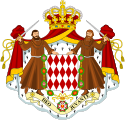Visa policy of Monaco
 |
|---|
|
Monaco does not have a visa policy of its own and the Schengen Visa policy applies. Although Monaco is not part of the European Union, or the Schengen Agreement, its territory is part of the Schengen Area by virtue of its customs Union with France as a result of the "Convention on Good Neighbourly Relations of 18 May 1963 on the entry, stay and establishment of foreigners in Monaco" between France and Monaco. The 1963 convention was adapted to allow Monaco to be administered within the Schengen Area as if it were part of France.[1]
The entry and stay of foreigners in Monaco is defined by the Ordinance n. 3.153 of 19 March 1964 concerning the conditions of entry and residence of foreigners in the Principality.[2] Both French and Monégasque authorities carry out checks at Monaco's seaport and heliport.
Diplomatic and service categories passports[]
Visa policy for holders of diplomatic and service passports in the Schengen area is not unified. The visa policy of Monaco for holders of diplomatic and service passports is identical to the visa policy of France, but differs from other Schengen countries.
In addition to nations whose all citizens are visa exempt, holders of diplomatic or service category passports of Algeria, Angola, Bahrain, Bolivia, Cabo Verde, Dominican Republic, Ecuador, Gabon, Indonesia, Kuwait, Morocco, Oman, Qatar, Saudi Arabia, South Africa, Tunisia, Turkey, United States (provided not travelling on duty) and only diplomatic passports of Armenia, Azerbaijan, Belize, Benin (biometric only), China, Congo (biometric only), India, Jordan, Kazakhstan, Kyrgyzstan, Mongolia, Namibia, Russia, Senegal, Thailand and Vietnam also do not require a visa.
Long term stay[]
Foreigners that desire to stay for a period longer than 3 months in Monaco require a resident permit.[3]
Souvenir passport stamp[]

When visiting Monaco, there is no passport control except of when coming from a Schengen country. Visitors were previously able to get souvenir passport stamps at a state tourism office.[4] Official passports are no longer stamped as this may cause difficulties with validity. Instead, a special 'souvenir passport' is available free of charge, in which these stamps may instead be placed.[5]
See also[]
| Wikivoyage has a travel guide for Monaco. |
- Visa requirements for Monégasque citizens
- Visa policy of the Schengen Area
- List of diplomatic missions of Monaco
- Foreign relations of Monaco
References[]
- ^ "COMMISSION STAFF WORKING PAPER Obstacles to access by Andorra, Monaco and San Marino to the EU's Internal Market and Cooperation in other Areas Accompanying the document COMMUNICATION FROM THE COMMISSION TO THE EUROPEAN PARLIAMENT, THE COUNCIL, THE EUROPEAN ECONOMIC AND SOCIAL COMMITTEE AND THE COMMITTEE OF THE REGIONS EU Relations with the Principality of Andorra, the Principality of Monaco and the Republic of San Marino Options for Closer Integration with the EU". Retrieved 21 October 2017.
- ^ "LégiMonaco - Textes non codifiés - Ordonnance n. 3.153 du 19/03/1964 relative aux conditions d'entrée et de séjour des étrangers dans la Principauté". www.legimonaco.mc.
- ^ Monaco, Gouvernement Princier de. "Demander une carte de résident / Nouveaux arrivants / Résidence / Nationalité et résidence / Service Public Particuliers- Monaco". service-public-particuliers.gouv.mc.
- ^ "Monaco Passport Stamp". 26 May 2015.
- ^ "Visit Monaco website". 14 February 2020.
- Foreign relations of Monaco
- Visa policy by country